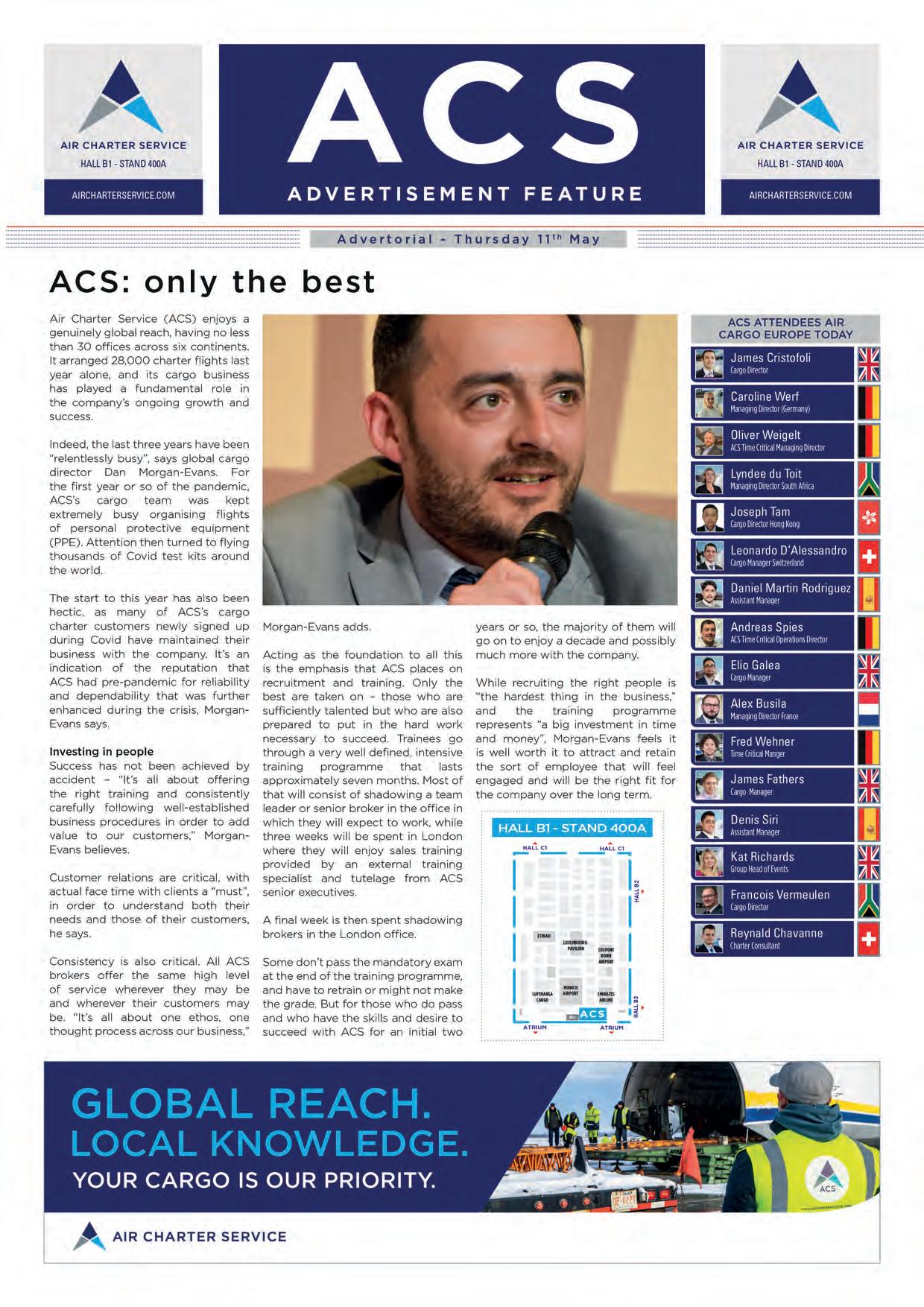ACW WORLD AIR CARGO AWARDS CELEBRATE THE INDUSTRY’S FINEST



The Air Cargo Week World Air Cargo Awards returned to Munich for the first time since 2019, celebrating the great and the good of the industry at air cargo Europe, part of transport logistic, the world’s leading trade fair for air cargo and logistics. Attendees gathered in a packed room to raise a glass to the winners of ten categories: Airfreight Forwarder of the Year, Air Cargo Handling Agent of the Year, Air Cargo Charter Broker of the Year, Airport of the Year, Air Cargo General Sales Agent of the Year, Air Cargo Industry Customer Care Award, Air Cargo Industry Achievement of the Year, Information Technology for the Air Cargo Industry Award, Air Cargo Industry Marketing and Promotional Campaign Award and Cargo Airline of
the Year.
The evening gave attendees a chance to celebrate those who have risen to the top despite a challenging global climate
“It’s a privilege to have this opportunity to celebrate these Awards with everyone at the return of this important exhibition,” Norman Bamford, director of Azura International, said.
“I’d like to extend my congratulations to all of the winners and finalists for showcasing the strength of the logistics industry.”
The event took place on the second day of the incredibly successful trade fair, with attendees and exhibitors showing the strength of the exciting opportunities in the industry across ten buzzing halls.
Follow Us:
MANAGING
...
Since its founding in the early 1970s, ATC Aviation has established itself as a pioneer in the ever-changing ...

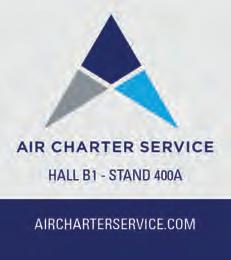

AIR CARG O WEEK DA ILY NE WS
Air France KLM Martinair Cargo has announced the next steps in its digital commercial approach ...
AIR FRANCE KLM MARTINAIR
PAGE 2
AIRFREIGHT
PAGE 22
PROVIDING CUSTOM ULD ... ACL Airshop, a key player in air cargo Unit Load Device (ULD) logistics solutions, has been serving the industry ...
THURSDAY • 11 MAY 2023 THE OFFICIAL DAILY NEWSPAPER OF AIR CARGO EUROPE 2023
PAGE 8
INSIDE
THIRD DAY
THIRD DAY
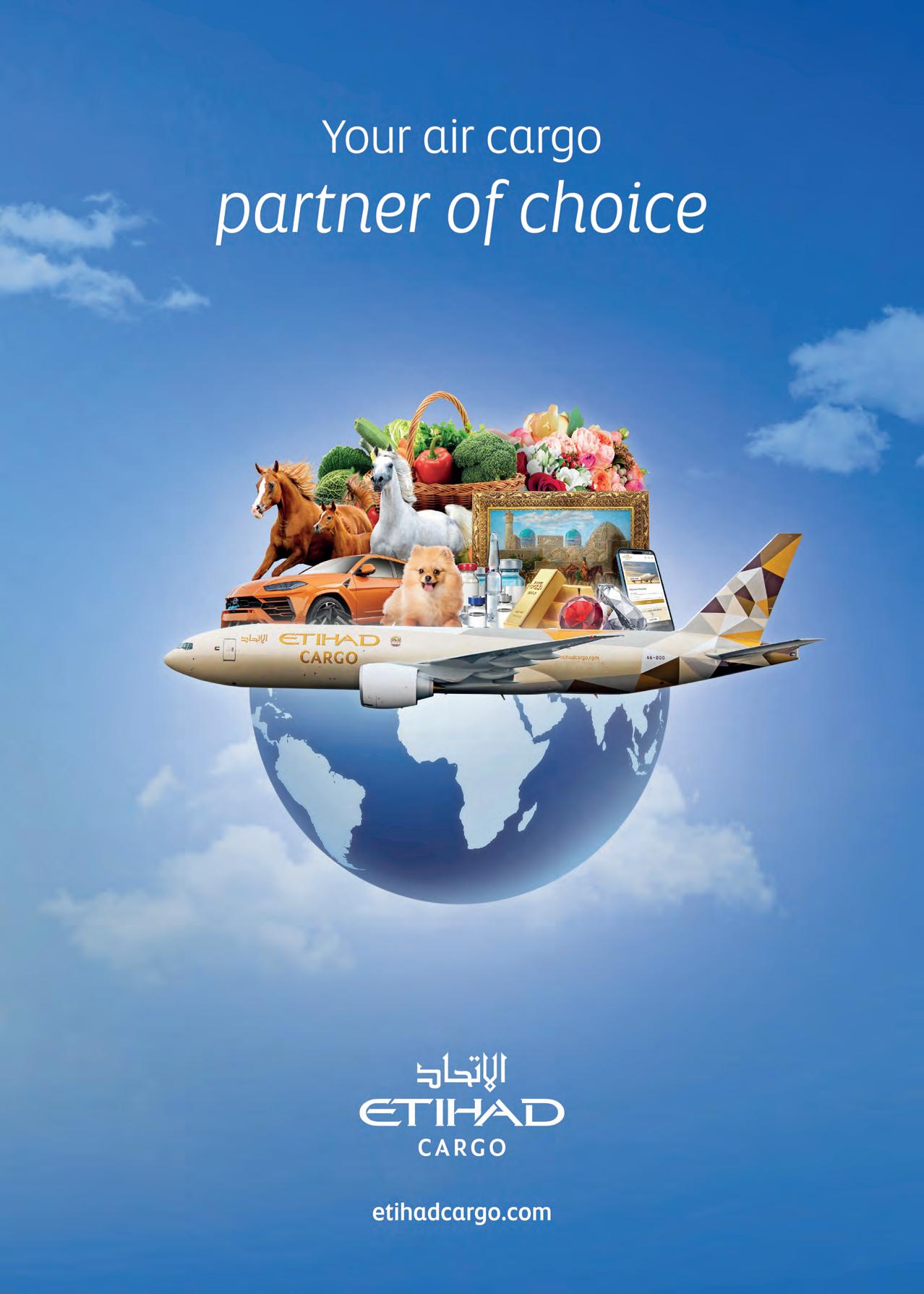
The top gun of airfreight take salute
Here are the well deserving winners of this year’s ACW World
Air Cargo Awards:

Airfreight Forwarder of the Year 2023


Sponsored by: Air France KLM
Martinair Cargo
Presented by: GertJan Roelands
Senior Vice President Sales and Distribution
Finalists: DB Schenker, DHL

Global Forwarding, DSV, Geodis, Kerry Logistics, Kuehne + Nagel

Air Cargo Handling Agent of the Year 2023
Sponsored by: Cologne Bonn Airport
Presented by: Thilo Schmid, CEO
Finalists: Aviapartner, dnata, HACTL Hong Kong Air Cargo Terminals Ltd, Menzies Aviation, Swissport, WFS Worldwide Flight Services
Editor: Edward Hardy
Director of Operations: Kim Smith
International Sales Director: Rosa Bellanca
International Sales Executive: Zainab Khalid
Finance Manager: Rachel Burns
Design & Production Manager: Alex Brown
Website Consultant: Tim Brocklehurst
Directors: Norman Bamford • Dawn Jolley
Air France KLM Martinair Cargo takes next steps in digital commercial approach
Air Cargo Charter Broker of the Year 2023
Sponsored by: SAVE Group
Presented by: Paolo Pistella, Cargo & Aviation Network Development Manager, GDA Handling – Brescia Airport
Finalists: Air Charter Service, Air Partner, Chapman Freeborn, CharterSync, Coastair, Hunt & Palmer
Air France KLM Martinair Cargo has announced the next steps in its digital commercial approach with the introduction of new digital services and allocation functionalities on its myCargo platform. The new allocation functionalities in myCargo are set to revolutionise the way customers manage their cargo allocations online. This unique digital service will enable them to view (automatically), book and manage their allocations via myCargo, providing them with greater control and flexibility.
Airport of the Year 2023
Sponsored by: Euro Cargo Aviation
Presented by: Hubert van der Laaken CEO
Finalists: Brussels Airport, Chicago Rockford International Airport, Cologne Bonn Airport, Dallas/Fort Worth International Airport, Incheon International Airport, Singapore Changi Airport
In addition to the initial release later this month, Air France KLM Martinair Cargo plans to introduce several new myCargo features in the months to come, such as automatically booking allotments for an entire season, thereby making allotment bookings much more efficient for our customers.
03 ACW DAILY NEWS
Printed by: Peschke solutions, Munich, Germany The views and opinions expressed in this publication are not necessarily those of the publishers. Whilst every care is taken, the publishers cannot be held legally responsible for any errors in articles or advertisements. No part of this publication may be reproduced, stored in a retrieval system or transmitted in any form or by electronic, mechanical, photographic or other means without the prior consent of the publishers. USA: The publishers shall not be liable for losses, claims, damages or expenses arising out of or attributed to the contents of Air Cargo Week, insofar as they are based on information, presentations, reports or data that have been publicly disseminated, furnished or otherwise communicated to Air Cargo Week. INTERNATIONAL AZ URA
Winner: DHL Global Forwarding
Winner: Hactl
Winner: Air Charter Service
Winner: Singapore Changi Airport
Jettainer and WestJet Cargo continuing successful partnership
More of the well deserving winners of this year’s ACW
World Air Cargo Awards:
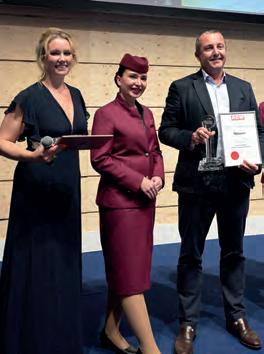
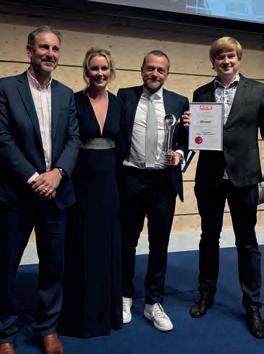
Air Cargo General Sales Agent of the Year 2023
Sponsored by: Awery Aviation
Presented by: Vitalii Smilianets
CEO and founder
Finalists: ATC Aviation, ECS Group, Euro Cargo Aviation, Global GSA Group, Kales Airline Services, TAM Group
WestJet Cargo and Jettainer have agreed on a longterm extension to their partnership.
Canada’s second largest airline and the international leader in outsourced ULD management announced the contract extension at air cargo Europe
“Since years, Jettainer has been a trusted provider of ULD management services for WestJet and has continued to improve and innovate its services... we could always count on Jettainer,” Kirsten De Bruijn, Executive Vice-President Cargo WestJet, said.
“We could not be prouder of the trust expressed through this renewed contract extension. Our partnership with WestJet is a prime example of how we focus on our customers’ individual needs,” Shailendar Kothari, Managing Director of Jettainer Americas Inc., stated

Winner:
Information Technology for the Air Cargo Industry Award 2023
Sponsored by: Brussels Airport
Presented by: Geert Aerts
Chief Cargo & Real Estate Officer
Finalists: Awery Aviation Software, cargo.one, Cargoflash, CargoTech, dnata, Kale Logistics, Nallian, Webcargo
Air Cargo Industry Customer Care Award 2023
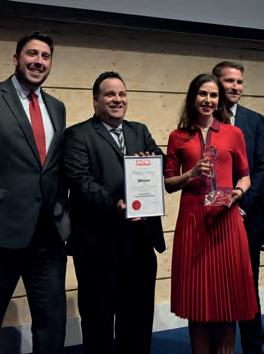

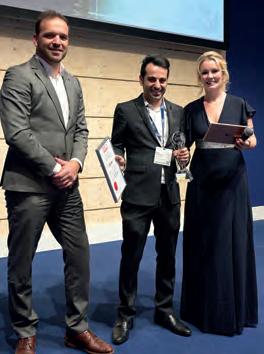
Sponsored by: cargo.one
Presented by: Moritz Claussen
Founder and Co-CEO
Finalists: Air France KLM
Martinair Cargo, Cologne Bonn Airport, dnata, ECS Group, Etihad Cargo, Raya Airways
Air Cargo Industry Achievement Award 2023
Presented by: Dr Robert Schonberger Exhibition Group
Director at Messe Munchen
Finalists: cargo.one, dnata, ECS Group, Etihad Cargo, Saudia Cargo, United Cargo
Air Cargo Industry Marketing & Promotional Campaign Award 2023
Presented by: Michael Wilton
Director and General Manager
MMI Asia Ltd. Pte
Finalists: ACL Airshop, CargoAi, Cargoflash, ECS Group, Qatar Airways Cargo, Webcargo
Cargo Airline of the Year 2023
Sponsored by: ECS Group
Presented by: Adrien Thominet, Executive Chairman
Finalists: Air France KLM

Martinair Cargo, American Airlines Cargo, Emirates
SkyCargo, Etihad Cargo, Qatar Airways Cargo, Raya Airways, Saudia Cargo, Silkway West Airlines, Turkish Cargo, United Cargo
04 ACW DAILY NEWS
Winner: ECS Group
Webcargo
Winner: Air France KLM Martinair Cargo
Winner: Qatar Airways Cargo
Winner: Etihad Cargo
Winner: Qatar Airways Cargo

GSSAs support the airfreight industry
Established in 1997, Euro Cargo Aviation has built up a reputation in the cargo aviation business as an independent GSSA. Offering pro-active communication with airlines and forwarders and local expertise with global market knowledge, the company recognises that its role is much more than sales and marketing.
It’s important that the airline’s product is supported, and the cargo is managed throughout its journey from arrival into a GSSA’s care until delivery to the client. Euro Cargo Aviation has created “service hubs” across its network that manage the flow of shipments for airlines and communicate to the customer along the route.
“These service centres are key to ensuring the agent is getting clear updates about their shipments and can be confident that they are managing the end to end process on behalf of the airline,” Hubert van der Laaken, CEO of Euro Cargo Aviation, said.
Relationships are key
This industry changes often and supply chain demands and process will always adapt.
As a GSSA, Euro Cargo Aviation needs to focus on the basics, which are – good customer, supplier and staff relationships, clear information, and process management of the customers cargo to get from origin to destination.
“We adapted well during the disruptions – moving from e-meetings, back to face to face and anything in between. It was important in these periods to have a clear understanding of changes in different regions and to adapt when needed,” van der Laaken stated.
Euro Cargo Aviation considers itself lucky that its team of professionals understand the industry and are career makers. “For sure inflation plays its part and we support our staff with different wage based initiatives – however the key is to remain lean and manage the costs for our client airlines – in each of our service hubs there is a responsibility to manage the cost structures of our client airlines so they can remain competitive,” Stuart Holland, Vice President of Euro Cargo Aviation, explained.
Controlling costs
The GSSA sector, like many others, face challenges on a regular basis,
requiring them to manage their layers carefully to control costs.
Euro Cargo Aviation’s management team all have roles and reasonability’s in the day to day business and its country level Managing Directors are real entrepreneurs who know how to manage their daily business.
“Managing costs is important to maintain competitive pricing, but we also believe in training younger staff to be the stars of the future and this type of investing will create the best people for the future,” Holland said.
Most crucially, Euro Cargo Aviation has a responsibility to deliver full flights and the best possible yield, at a competitive price whilst managing its clients’ costs.
“However you model this, it’s crucial you have a solid, professional workforce who are motivated – followed by investment in people to manage the flow of cargo. Technology will play a major part in the coming five years – but the industry also needs to be ready to accept it in a greater way,” van der Laaken said.

Global coverage
With offices in The Netherlands, Belgium, France, Sweden, Norway, Denmark, Finland, Lithuania (Baltics), Germany, Austria, Switzerland, Poland, The United Kingdom, Ireland, China, Hong Kong, The United States, United Arab Emirates and Uganda, Euro Cargo Aviation has a global footprint.
“We are strong players in Europe, Africa, USA and Asia – we want to keep evolving in these areas and growing our strong alliances and partnerships – We have more recently started our journey in the Middle East with the start-up of a Dubai office – from here we will plan to expand in this very important region,” van der Laaken highlighted.
“Asia plays an important role in our growth strategy, and we can see some positive growth that we will support and invest in the future,” Holland added.
“Alliances are important and strong partnerships with suppliers –some may prefer the one stop shop environment – but our customers are evolving, and they are flying to new places that are not always on the map of every GSSA – we believe it’s important to have key regions that you have a solid footprint – then work with good partners where needed,” he continued.
06 ACW DAILY NEWS

Providing custom ULD solutions for 40 years
Airshop has the ULD inventory, global network, and experienced staff to get it done very well 24/7/365. Couple that to an expanding array of long-term ULD management contracts and you have a whole new level of corporate strength,” Townes stated.
Digital-driven
ACL Airshop, a key player in air cargo Unit Load Device (ULD) logistics solutions, has been serving the industry for 4 decades. Over the past 40 years, ACL Airshop has become a leading worldwide one-stop shop for leasing, sales, repair and fleet control of ULDs and cargo control products manufacturing for the aviation industry.
A technology-enabled worldwide provider of ULD, cargo control and air freight products and logistics services for the aviation industry, ACL Airshop offers a range of unique products to numerous leading passenger and airfreight carriers.
“Success is contagious. Customers choose to do business with companies that are in strong condition and have responsive teams of experts to handle their requirements. We are blessed with great people and an exceptionally good business model. With 2023 as the anniversary, we’ve been perfecting our service model for 4 decades,” Steve Townes, President & CEO, explained.
Worldwide presence
With more than 60,000 ULDs owned, maintained or leased by ACL Airshop, including air freight pallets and containers, the company operates from over 50 airport hub locations across North America, Europe, Asia Pacific, the Middle East and Latin America.

One of the unique aspects of the company’s offerings is short-term rentals and leasing solutions for airlines’ cargo products requirements— that is where ACL Airshop has made its strongest reputation for Custom ULD Solutions.
That includes one-way leasing and convenient drop-off’s. Yet additionally, in the past several years the company has developed a large, growing portfolio of multi-year ULD management & logistics contracts with various air carriers.
Nowadays, the company maintains the largest independent inventory of lease-ready ULD assets in the industry for short-term solutions, and also has a growing array of longer-term ULD Management contracts.
The company’s strategic intent is to maintain market leadership in short-term solutions while expanding the recurring long-term revenues in fleet contracts.
“Short-term leasing is not easy, it’s a daily rugby scrum. But ACL
Recent innovations in ULD Tracking solutions include ACL’s recently launched FindMyULD™ app and implementation of COREInsight’s Bluetooth logistics technology for its valued air carriers and cargo customers. And everything ACL does is backed by a commitment to its core values, a dedication to quality and its scalable, user-friendly technology.
Airlines worldwide have valuable assets in their Unit Load Devices (ULD), pallets, containers, as well as the cargo loaded in the ULD equipment. Keeping track of these assets can now be made easier and cheaper by tagging the ULD units using COREInsight®.
With a COREInsight tagged ULD supplemented with a suite of web based reports, a carrier can visually update their systems regarding allocation of the ULD as well as the shipments carried within the unit. You now see, in real-time, the location of ULDs and relationally the cargo loaded on or inside them.
“We had a strategic light-bulb moment in 2017 at the IATA symposium in Abu Dhabi. That’s when we teamed with CORE Technologies and became first-in-market with Bluetooth tracking and tracing. We already had our proprietary ULD Control system in place. We later developed the FindMyULD App. To be a market leader, a company must also be a technology leader. Our Digital Suite today is extraordinary, and incrementally improving every year as we go forward. It is a neverending investment roadmap,” Townes added.
Meeting your needs
ACL Airshop operates in five pillars of highly complementary business segments: ULD Leasing, ULD Sales, ULD Repair, ULD Control, and Cargo Products Manufacturing.
The company’s aforementioned short-term solutions satisfy myriad needs in the fast-paced frenetic global ecosystem of air cargo, while the long-term contracts yield cost-efficiency and stable logistics improvements for clients.
Looking to the future, the company will keep ramping-up its customer-focused plans around the world, investing in technology innovations, expanding its long-term contracts portfolio, remaining the market leader for short-term leasing solutions, and fostering a very high-performance culture as a strongly entrepreneurial employer.
“Voice of the Customer surveys tell us that ACL Airshop is on the right track, and highly responsive to customer requests. We want to be the Partner of Choice for customers who see unique value in how we do business for them, and the Employer of Choice for air cargo & aviation logistics zealots who love this industry,” Townes said.

“
Short-term leasing is not easy, it’s a daily rugby scrum
08 ACW DAILY NEWS

Latest data show U.S.-China decoupling
Aseries of global shocks over the past decade—from Brexit and the US-China trade war to the Covid-19 pandemic and Russia’s invasion of Ukraine—have prompted many to speculate about the end of globalisation. But sound decision-making must distinguish between predictions and actual shifts in international activity. The latest data on the size
and geography of international flows strongly rebut the notion that a major retreat from globalisation is underway.
The DHL Global Connectedness Index measures globalisation based on international flows in four domains: trade, capital, information, and people. The index declined slightly in 2020, when the Covid-19 pandemic and efforts to contain its spread caused sharp drops in trade, foreign direct investment (FDI), and international travel. But by 2021 it had rebounded to above its pre-pandemic level, reaching a point just shy of the all-time high recorded in 2017. Preliminary data and projections suggest that the index rose again in 2022.
The report also examines three fundamental questions that lie at the center of current debates about globalisation: Are global flows still growing? Is geopolitical rivalry fracturing the global economy into rival blocs? And are international flows becoming more regional?

On the growth of global flows, the evidence strongly rebuts the notion that globalisation has gone into reverse. International trade, capital, and information flows have all surpassed pre-pandemic levels, and the recovery of people flows accelerated in 2022. International trade in goods reached 10% above its pre-pandemic level in mid-2022, while trade in services surpassed pre-pandemic levels in early 2022 and foreign direct investment did so in 2021. International travel, in contrast, remained 37% below its 2019 level in 2022, but it more than doubled from 2021.

Most types of international flows are likely to continue growing in 2023, albeit at a slower pace. This is due mainly to weaker global economic growth following large interest rate increases aimed at curbing inflation.
On the effects of geopolitical tensions, there is clear evidence of the U.S. and China reducing their focus on flows with each other. Considering a sample of 11 types of trade, capital, information, and people flows, the share of U.S. flows taking place to or from China fell from 9.3% in 2016 to 7.3% in 2022 (or the most recent year with data available). Meanwhile, the share of China’s flows that were to or from the U.S. fell from 17.8% to 14.3%. Those are noteworthy declines relative to 2016 levels, but small changes relative to the U.S. and China’s total flows with the world. And even after these declines, the U.S. and China are still connected by far larger flows than any other pair of countries that do not share a border.
ACW DAILY NEWS
but no signs of deglobalisation
Decoupling between the U.S. and China has not—at least yet—led to a wider fracturing of the world economy into rival blocs. Close allies of the U.S. and China, as classified in research by Capital Economics, have not substantially reduced the shares of their flows with the rival bloc. The share of U.S. allies’ flows involving China and its close allies fell only from 8.8% in 2016 to 8.2% in 2022 (or the most recent year with data available). And the share of China’s allies’ flows involving the U.S. and its close allies only fell from 40% to 38%. The declines for allied

pattern involves people flows, due to a higher proportion of travel during the Covid-19 pandemic taking place between nearby countries.
International flows, nonetheless, are already highly regionalised. Roughly half of international trade, capital, information, and people flows take place inside major world regions, about three times more than one would expect if flows were not constrained by the distance and differences between countries.
It remains an open question whether international flows will become more regionalised in the future. Many companies are focused on nearshoring to produce goods closer to their customers, and major supply chain reconfigurations can take several years to execute. Governments in many countries are supporting these regionalisation efforts. On the other hand, the fact that international flows are already highly regionalised limits the scope for large increases in regionalisation. In addition, many companies, rather than nearshoring, have adopted other strategies to boost resilience, such as digitisation and dual sourcing. And many of the attractions of long-distance flows are not going away.
The resilience of globalisation in the face of successive shocks is a positive development, since there is strong evidence that trade and other flows support economic growth. It is also clear that international connections dramatically expand the world’s capacity to solve problems. The public policy environment has, nonetheless, become less conducive to the growth of global flows. Trade protectionism has increased, international investments face heightened scrutiny, and data flow restrictions are proliferating. Meanwhile, geopolitical tensions challenge international cooperation and key institutions, such as the World Trade Organisation.
countries were also less widespread across types of flows than those for the U.S. and China themselves.
On the possibility of rising regionalisation, there is no robust evidence of a rising trend in the share of international flows taking place within major world regions through 2021. If international flows were becoming more regionalised, they would take place over shorter distances, on average. In fact, trade and many other types of flows have tended to take place over longer distances. The main exception to this
These and other challenges to globalisation must not be ignored. Instead, they should motivate a renewed focus on making globalisation work better, expanding its pool of beneficiaries and better managing its challenges— what some have started to refer to as reglobalisation.
History shows that globalisation can go into reverse, but it has proven remarkably resilient through recent shocks. This resilience provides a strong platform for policy efforts aimed at making globalisation work better. Reglobalisation does not have to start with rebuilding from the ground up. And the strength of global flows provides strong incentives for companies and countries to stay engaged.
11
“
decoupling
History shows that globalisation can go into reverse, but it has proven remarkably resilient through recent shocks
Hermes and Awery forge partnership to launch joint product h2A
Hermes Logistics Technologies (HLT) and Awery Aviation Software (Awery) have announced a partnership agreement, launching their new innovative Software as a service (SaaS) solution for airlines, h2A.
h2A, powered by Awery and Hermes, is a cloudbased end-to-end solution enabling airlines to manage, monitor, and automate aviation business processes and cargo operations on an integrated IT platform.

Developed with a unique range of functionalities from both companies, h2A is the only comprehensive platform that manages all processes from warehousing and flight management to commercial activities.
“The collaboration is in response to the industry needing to benefit from the harmonisation of numerous workflow processes through true integration and digitalisation,” Tristan Koch, Chief Commercial Officer, Awery, said.

“We believe this will bring our clients greater efficiency, more process control, and the best customer experience.”
By combining HLT’s experience as a leading provider of Cargo Management Systems and Awery’s knowledge of creating scalable aviation software platforms, the pair have created the first-of-its-kind product, offering airlines a single solution from cargo booking to end destination.
Yuval Baruch and Vitaly Smilianets, Chief Executive Officers of HLT and Awery respectively, stated that the collaboration is the beginning of a new era for digitalisation in the industry.
“At HLT we believe that collaboration between tech partners offering best of breed solutions is key to truly optimising air cargo management, and our joint venture with Awery marks a significant step in our strategy to help digitalise the industry,” said Yuval Baruch, Chief Executive Officer, Hermes Logistic Technologies.
“h2A brings the best of both our market leading functionalities together, and users will benefit from a one-of-a-kind Airline SaaS solution which is the most comprehensive and advanced on offer in the air cargo industry.”

12 ACW DAILY NEWS

Technology reshapes the
Wiremind is a founding member of CargoTech, an industry alliance that seeks to offer a digital solution for every air cargo business process. Through innovation and customer focus, its target is to be the easiest solution provider to work with and the preferred choice for airlines, GSAs, freight forwarders and GHAs.
Technology is a fundamental prerequisite for any effort in enhancing supply chain visibility and doing so in a scalable manner. In an industry like air cargo, this is particularly true because of the number of stakeholders involved in the core process of moving goods from point A to point B. Luckily, as an industry, it is making significant progress towards digitising offline touchpoints to at least have the initial digital visibility required.
The logical next steps will likely involve harmonising standards and communication protocols further to align the many stakeholders in the air freight supply chain, while also working towards addressing other “visibility gaps” such as piece level information and tracking.
With its mission in mind, Wiremind is seeing some very interesting technological developments across all facets of the airfreight industry, particularly as processes migrate online which will enable the extensive use of that data for analysis and to optimise different parts of the cargo lifecycle.
SkyPallet solution
SkyPallet is being used by multiple stakeholders in the airfreight sector, from airlines to forwarders and GSAs, which is testament to the utility and flexibility of the product. SkyPallet is a palletisation tool which means that its ‘objective’ is to find an optimised or improved solution of how to place and arrange cargo shipments in such a way that it minimises the space or volume occupied by the cargo and maximises remaining available space.
Importantly, there are many standard and user-defined constraints that SkyPallet
factors in when producing a solution, such as aircraft and ULD dimensions or co-loadability restrictions. Clearly each stakeholder in the airfreight supply chain has a desire to ensure that available space is fully utilised for commercial and efficiency reasons, which SkyPallet allows its users to do in a matter of seconds.
“One thing we are particularly excited about in the ULD space is the growing use of physical dimensioning scanners in warehouses to
that it provides a “source of truth”. It supplies a basis for a discussion to help minimise disagreements in load plans or special cargo handling between commercial teams responsible for capacity control and the cargo operations teams responsible for the actual build up.
Universally beneficial
The adoption of technological innovation, or lack thereof, is not confined to particular
accurately measure tendered cargo and how this can support the palletisation process. While many of our customers have been using the SkyPallet palletisation solution for some years now, they also see that improved accuracy on the dimensions is the next step that will lead to further increase in the added value it provides,” Nathanaël De Tarade, CEO of Wiremind Cargo, said.
This is particularly the case for more operational use cases of SkyPallet which occur once cargo is tendered at the warehouse. Wiremind sees a strong synergy between dimension scanning and SkyPallet, as its software can quickly retrieve these scanned dimensions via an API integration to rerun its calculation and determine a new optimal result.
This year, a significant part of our SkyPallet roadmap will be dedicated to improving its capabilities in supporting cargo operations. A key added-value of SkyPallet, which customers have shared with Wiremind is
geographical areas. There are many different companies at the forefront of this digitalisation drive, spanning the whole globe. However, what can be said is that the adoption of technological innovation is not necessarily something that can happen overnight.
It requires a long-term concerted strategy and investment to ensure that the foundations in terms of data availability, technical architecture and organisational skill sets are readily implemented. It is in this area that we do see some differences in the preparedness of organisations, albeit not geographically confined.
Based on Wiremind’s experience, there are two challenges companies have often highlighted when looking to adopt technological solutions. The first is the availability of clean, well-structured data that can be effectively used and analysed to extract meaningful insights, or in our case, to be fed into powerful data science models

ACW DAILY NEWS
“
We are seeing many airlines seriously considering using these products for their revenue optimisation needs
the airfreight industry

to produce predictive recommendations. In the absence of such, there is a considerable data engineering effort required to understand and clean data to ensure it is fully usable. Second, is the importance of respecting the business processes which any technological solution becomes part of and placing a strong emphasis on change management.
Too often technological products are built in isolation from the underlying process and therefore there is a mismatch. This is something Wiremind desperately seeks to avoid by carefully working with customers to study and understand processes to ensure good product fit.
“We think it is very important for all airfreight stakeholders to embrace digitalisation and adopt technological innovation. While we understand that it is a substantial undertaking to get started, we have seen the multiple benefits of such innovations materialise and more airlines increasingly prioritise digital roadmaps,” de Tarade said.

“This is significant for two reasons - first, there is demonstrable value in adopting technological innovations which result in tangible benefits, benefits which airlines who have not started won’t be benefiting from. Secondly, an increasing separation will emerge between the airlines that have embarked on their digital transformation earlier and those that have not, particularly taking into account the lead time and necessary investments required to get started,” he continued
Wiremind has seen digitalisation accelerate over the last few years particularly within airlines looking to moderise their commercial processes and harness the data they currently have. A core part of its product offering is its use of data and adoption of inhouse-built data science models which can provide predictive forecasts and optimised recommendations.
“We are seeing many airlines seriously considering using these products for their revenue optimisation needs. One such example is our Revenue Management module which analyses historical and live demand flows and rates to devise a demand forecast and associated optimal hurdle rates to sell capacity at,” de Tarade explained.
15
Engine of connectivity in
Air France KLM Martinair Cargo (AFKLMP) is the air cargo business of the Air France KLM Group, bringing together a combined fleet of three airlines, enabling the transportation of a diverse range of goods globally.
Alongside cargo belly capacity within their passenger fleet, AFKLMP’s freighter aircraft provide flexible main deck capacity. This adaptable approach allows the carrier to provide customers with a comprehensive array of services and solutions, meeting market needs, creating smooth connections and moving goods seamlessly around the world.
AFKLMP operates out of two hubs - Paris Charles de Gaulle and Amsterdam Airport Schiphol. These locations reflect its mission to connect customers across its vast network of 230 flight destinations worldwide, moving nearly one million tonnes of cargo in 2022.

Partnerships power the business
To allow AFKLMP to operate the world’s most extensive global cargo network, the group has placed significant emphasis on building partnerships.
On the passenger and cargo side, the company has entered into joint ventures with Delta Airlines and Virgin Atlantic for Transatlantic flights, providing customers with a wider range of logistical solutions.
On the cargo side, AFKLMP has begun collaborating with CMA CGM Air Cargo (CCAC) to focus on the full freighter segment of the business. AFKLMP currently operates six freighters, primarily focused
on the perishable markets of Africa and South America, while CCAC primarily operates in Asia. This partnership enables the companies to offer an enhanced freighter network to customers and greater opportunities for charters.
“AFKLMP is committed to exploring partnerships that offer benefits to its customers. The company’s primary focus is on strengthening its existing partnerships and making it even more convenient for customers to do business with regards to our joint service offer,” GertJan Roelands, Senior Vice President Commercial at AFKLMP, said.
Environmental focus
Sustainability is at the core of AFKLMP’s mission, ingrained in the organisation’s DNA. The aviation industry faces a significant challenge in becoming more sustainable, and AFKLMP has taken numerous initiatives over the years to reduce its carbon footprint.
Two years ago, AFKLMP became the first airline group to introduce a Sustainable Aviation Fuel (SAF) Programme in the airfreight industry. Recently, the company launched its “goSAF” proposition, enabling customers to purchase SAF on a booking level via the myCargo portal, thereby reducing the footprint on an AWB level.
For all flights departing from Amsterdam and Paris, AFKLMP fuels its flights with 1% SAF. The company also recently placed an order to replace its existing freighter fleet with the Airbus A350F, which are 40% more fuel-efficient and produce 50% less noise.
AFKLMP has also introduced various sustainable measures for
ACW DAILY NEWS
in the airfreight industry
ground handling, including carton beams, lighter nets, a transition towards electrical equipment, and waste management.
“As an airfreight industry, we understand that addressing environmental challenges is beyond our individual capacity. Therefore, instead of competing, we must collaborate on sustainability. Safety is not a competitive factor, and sustainability should be treated similarly,” Roelands stated.
Though many fascinating sustainability initiatives are underway worldwide, AFKLMP believes that coming together can catalyse, accelerate and transform the industry to meet climate goals. Its goal is to mobilise the airfreight industry by collaborating with airlines, shippers, forwarders, fuel suppliers, and relevant associations. AFKLMP believes that by uniting, we can achieve more than the sum of individual efforts.
“To demonstrate our commitment, we have partnered with Delta and Virgin through our JV sustainability working group. We collaborate and share best practices to develop a joint action plan. Additionally, we actively support SmartFreightCentre’s ambition to develop a single source of truth in sustainability-related topics,” Roelands explained.
Embracing technological innovation
AFKLMP recognises the critical importance of digitalisation. Its industry-leading myCargo portal allows customers to make bookings 24/7 and offers a full range of digital services, such as Track & Trace,

Modify My Booking, and e-Claims. AFKLMP has made great strides in fully digitalising its customer journey and the products it offers.
AFKLMP recently announced that real-time e-AWB validation details are now available in myCargo. This is part of its work to continuously improve its Track & Trace tool by adding new services and data sources. “Our focus is to incorporate temperature data as our customers require more control over the condition of their shipments. We take it as our responsibility to drive developments to meet customer demand and exceed their expectations,” Roelands said.
Additionally, the group has advanced in connectivity by developing its Sales API, which allows customers to directly connect their booking system with its digital services, streamlining the process and making it easier to do business with us. This also enables customers to improve their time to market and enhance service for their customers (shippers) when it comes to booking airfreight capacity.
Currently, 72% of AFKLMP’s bookings are made through its online channels, which is unique for a B2B environment. “While we recognise the importance of our digital offering, we believe that our people make the difference when it comes to delivering excellent service to our customers. We understand that not all activities can be fully digitalised, and we strive to be there for our customers when they need us. Our “Bionic Servicing Strategy” is based on finding the right balance between our talented customer service representatives, spread across over 60 offices worldwide, and our digital proposition,” Roelands said.
17


Miami Airport (MIA) has seen cargo operations boom in recent years, recording a record breaking period in 2021 with 2.75 million US tonnes of airfreight coming through the hub. 2022 saw MIA almost break its own record again, handling 2.73 million US tonnes.
Since rebounding from the pandemic, MIA has experienced its strongest three-year stretch ever for total airfreight between 2020 and 2022.
The key to MIA’s cargo performance has been maintaining a strong airline and air route network, with a total of 100 airlines – 57 passenger airlines serving 175 non-stop markets and 43 freighter airlines serving 105 non-stop markets.

MIA is the undisputed gateway to Latin America and the Caribbean region. Just in terms of freighter service, it provides access to 30 markets in South America, eight markets in Central America, 32 markets in the Caribbean, and seven markets in Mexico. In addition, it offers belly cargo capacity to 78 non-stop markets in this region with 1,295 average weekly passenger flights and freighter service to ten transatlantic markets in Europe, the Middle East and Africa; and to eight cities in Asia.
“Throughout the pandemic, MIA has been able to retain most of its airlines and has been quite successful with its air service development program,” Jimmy Nares, Section Chief of Aviation Marketing at MiamiDade Aviation Department, said. “MIA is truly a global gateway.”
Balancing passenger and cargo traffic
Passenger travel has returned in a big way at MIA. In 2022, the airport established a new record of 50.6 million passengers, eclipsing its previous record set in 2019 (pre-pandemic) by approximately 10%. With the return of passenger flights, MIA did not experience much of a short fall in cargo operations, down only a small fraction from the previous year.
“We see this as an encouraging sign because as passenger flights return, so does belly capacity on those flights, which theoretically, should also result in increased cargo volumes,” Nares stated.
MIA is different than many airports in that it has dedicated staff working on developing and maintaining our cargo programs from both a community and air service development perspective.
“We have not lost sight of the importance of cargo and logistics to our local community and will continue to work on keeping our airport
Building a global gateway in Florida
competitive when it comes cargo and trade,” Nares added.
A mix of focusing on core strengths in terms of cargo, while also working on initiatives to develop new verticals such as pharmaceuticals has driven the continued growth of the airfreight operations at MIA. For example, while MIA historically accounts for 69% of all US perishables air imports, the airport carries out a “Perishables Road Show” program to conduct outreach at countries of origin in order to streamline the importation process and improve efficiency at MIA.
In terms of pursuing new cargo opportunities, in 2015, the airport identified pharmaceutical cargo as a growth sector and it developed a CEIV pharma certified airport community. MIA’s pharmaceuticals cargo has been steadily rising since and reached a record year for volume in 2021 (19.7 million kg), and for value in 2022 ($6.93 billion), respectively. Over the past five years, volumes surpassed the 16,000 metric ton mark for four out of five years.

Sustainable and digital future
Sustainability is factored into everything the team at MIA is currently doing and are planning for in our future operations. Just as it is for MiamiDade County, which MIA is a part of, sustainability has become part of its DNA.
“We are constantly exploring ways to improve the environment, lower emissions that account for global warming, and mitigate negative impacts on our community. As an example, the VICC project will be designed to be completely self-sufficient, utilise solar panels as well as an entire electric fleet of support vehicles, and will encourage the use of sustainable/recycled materials in its construction,” Nares explained.
MIA has been working with its cargo community to facilitate the implementation of CCS and electronic Air Waybill for some time. The team expects that within a very short period, its stakeholders will announce some of the projects they have been working on.
“As more companies incorporate technology into their operations at MIA, the airport will see its efficiency improve, operating costs will be reduced, the airport will become even more competitive in the market, and cargo volumes will ultimately increase,” Nares highlighted.
“MIA’s focus now is on capital improvement projects to both add onairport capacity and improve efficiency so that we can keep pace with projected growth in demand for cargo for many years to come,” he said.
20
global Florida
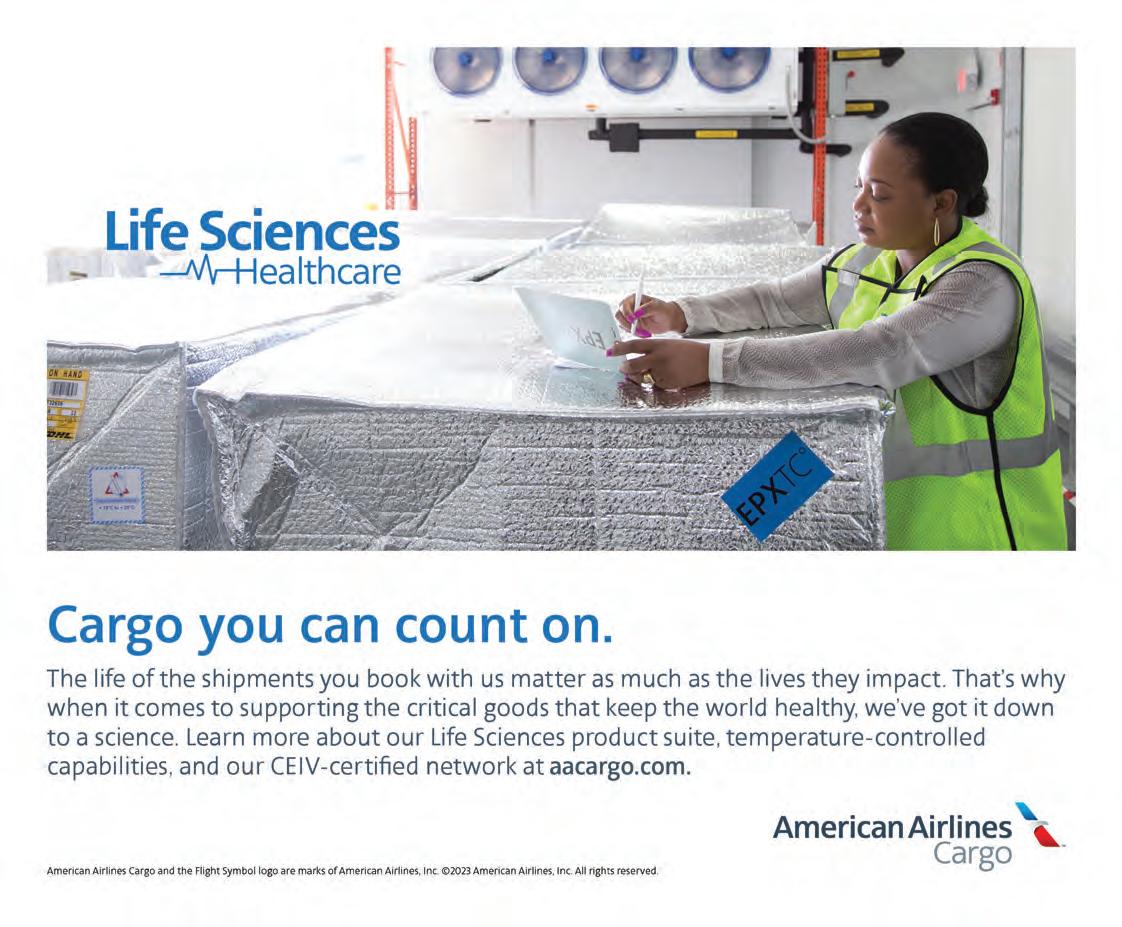
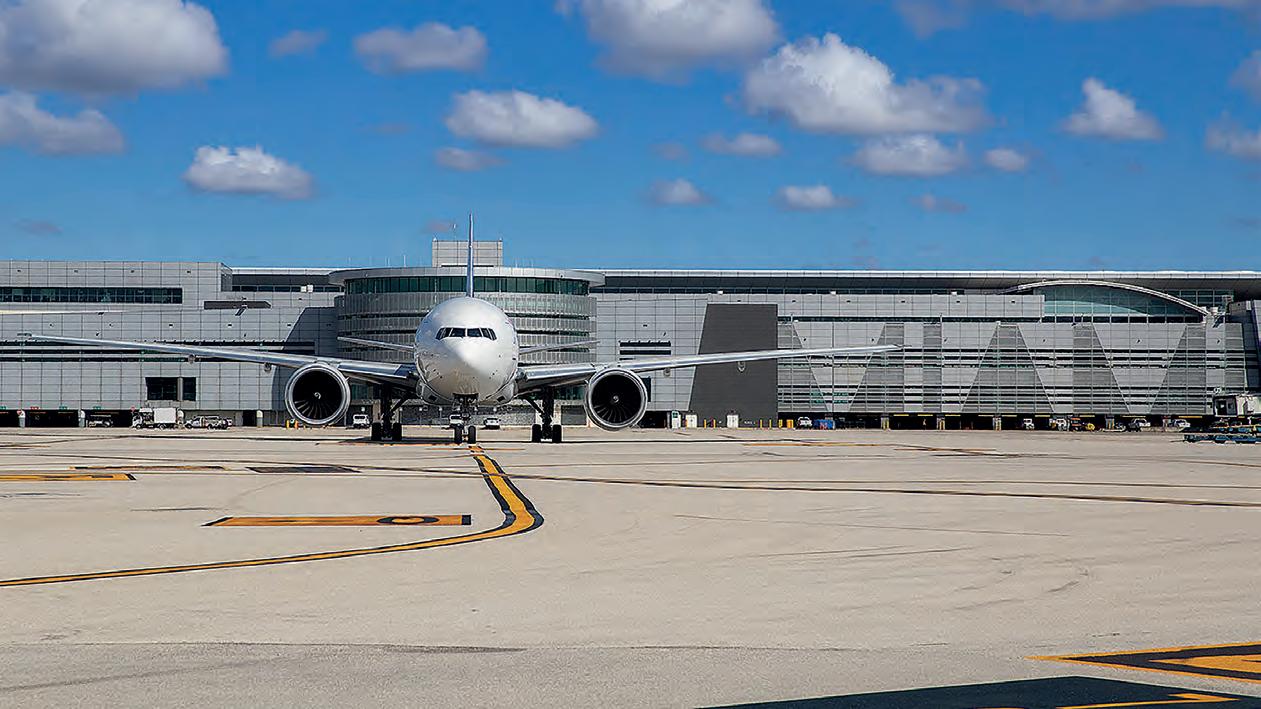
ACW DAILY NEWS
Managing airfreight operations in a changing GSSA landscape
Since its founding in the early 1970s, ATC Aviation has established itself as a pioneer in the ever-changing General Sales and Service Agents (GSSA) industry.
Over the decades, ATC has gone from being the first GSSA organisation to provide coverage with company-owned and dedicated officers in several European countries to having bases across the world.
ATC hasn’t just grown in scale during its time in existence, it has had to adapt its operations to meet the changing requirements from customers. While 20 years ago a GSSA was only focusing on the pure sales of airline services, nowadays it needs to cover a wider level of services.
For example, the conventional role of a GSSA is shifting as digitalisation transforms the market. Digital marketplaces are getting widely used but seen as an addition to the traditional sales channels. Customer service and after sales services performed by GSSA`s are still playing a vital role.
Today, GSSAs are scanning and discovering new markets, based on different data sources for example IATA, CASS, Seabury. With this data ATC Aviation is able to advise its airline customers about market trends and changes and react accordingly.
Range of services
ATC Aviation offers a range of services, including trucking services, supervision of aircraft loads to optimise load factors, studying and evaluating new routes for airline customers and developing new products in tandem with the airline customers.
In its portfolio, ATC Aviation also provides: segmented sales, traditional sales, total cargo management (TCM), onboard courier service, charters and part-charters.
The GGSA prides itself on being able to provide airline customers with individual modules based on their needs or the entire “wellbeing” (full service) programme. Sales, customer service functions, CASS billing, market reports and analyses, supervision of online flights and trucks complete its service portfolio.
“Our very flexible GSSA management product enables us to tailor our services to meet any needs our partners may have,” Ingo Zimmer, CEO ATC Aviation, said.
“In addition to being a crucial part of our partner’s success, our key competencies in market research, business intelligence, and airline consultancy set us apart from other GSAs. Because of our network, we may offer services to an individual countries, a whole region, or even a global contract,” he added.
Digitalisation to the max
The conventional role of a GSSA is shifting as digitalisation transforms the market, with digital marketplaces supplementary to the traditional sales channels.
The air cargo industry has faced a turbulent time in recent years. Challenges during Covid has led to a complete change of working environment. The pandemic has forced digitalisation to a very high level, decreasing office space by 40% and continuing the concept of partial homeworking of its team members.
“The initial phase was very challenging but together with our team we managed it very well. The efforts have paid off as we are on a very high level of digitalisation within our company, so that we can work digitally from anywhere in the world. During Covid we have helped our airline customers to sell pax to freighter charters, we supported vaccination initiatives from all over the world,” Zimmer explained.
“A lot of work can be digitalised, with new technologies coming up but I think, in our industry, we still need emotional intelligence to find out what your customer really wants,” he continued.
The next step
During the last few years, the air cargo industry has had to face changes in the global trade environment and a strong development of technology.

To stay competitive and keep up with the constantly shifting global trade scene, the GSSA sector has needed to continue to be flexible and open to change. To reorganise business processes, boost productivity, and cut costs, GSSAs must continue the digitalisation process.
With ATC Aviation a market leader in Central Europe, South America and the United States. “A white spot is still Asia where we have representations in India, Korea, Hong Kong and Thailand – so far but we are going to start up new offices in the next few years,” Zimmer said.
22 ACW DAILY NEWS

The Importance of Risk Management for Air Freight Handlers

Transporting freight by air is an efficient, fast method of transporting goods around the world, and freight transportation by air is big business. The Bureau of Transportation Statistics reports that US airlines realis9ed $84.2 billion in cargo revenue ton-miles in 2022 alone. The International Air Transport Association (IATA) reports that airlines transport more than 65 million cargo tons of freight and goods every year, accounting for 35% of the value of global trade. Given the importance of air cargo transport within the global supply chain, it’s critical to manage risks for airfreight handlers to ensure the safety of workers and the public, reduce damage, avoid accidents, prevent thefts, and facilitate the prompt delivery of goods to their destinations.
The Job of Air Freight Handlers
Air freight handlers play essential roles in the air cargo transportation sector. They are responsible for ensuring freight is moved through a warehouse, transported to the airport, moved through it, and properly loaded on an airplane. Freight handlers might be responsible for weighing freight and preparing orders before the cargo is loaded onto the plane. Freight handlers must sometimes weigh the freight and prepare the shipping orders before the freight is put on the plane. When loading freight onto planes, freight handlers must secure them to prevent them from shifting during transit to prevent damage to the freight and the plane. Freight handlers must also ensure the freight is labeled correctly so that it reaches its destination.

Common Risks With Air Freight Handlers
As a part of the ground operations of an airport, freight handlers are not as heavily regulated as others within the airline industry. However, they must ensure that proper procedures are followed based on handling different types of air cargo.
ACW DAILY NEWS
Freight brokers and forwarders need to be aware of the risks involved with handling air freight to ensure regulatory compliance and reduce exposure. Some of the common risks associated with handling air freight include the following: Transportation risks involved with getting the freight from warehouses to the airport; accident risks involved with ad-hoc cargo transportation flights; transit delays caused by bad weather and other factors; air freight thefts; capacity risks; safety risks with loading and unloading freight on planes; causing damage to loading ramps and airplanes.
Why Risk Management Is Important
Risk management is important for freight handlers for multiple reasons. Identifying and evaluating risks involved with handling freight can help companies determine how to deal with or minimise the risks. Sound risk management processes for freight handlers can protect the safety of workers and the public, reduce the potential for damage to the freight, help to ensure that freight reaches the appropriate destinations on time, and help to prevent losses caused by damage and theft. Risk management processes can also reduce a company’s liability exposure and related losses. Finally, risk management strategies can help to ensure regulatory compliance and avoid the potential of substantial penalties, fines, and possible business closure.
Steps in Managing Risk
The first step to managing risks for freight handlers is to assess and identify each risk. Stakeholders should meet to brainstorm and identify all potential risks that could occur. Once all of the relevant risks have been identified, each risk should be assessed in terms of its likelihood of occurrence and the size of its impact if it does occur. Risks that have the greatest likelihood of occurrence and the largest potential impacts should then be prioritised over those that are less likely to occur.
The company should then evaluate each identified priority risk and determine how to handle it. It can choose to accept the risk if doing so offers more benefits than avoiding it. A freight handling company can avoid risks that offer little benefits as compared to the risks involved by turning down a contract. In some cases, it might make more financial sense to decline a potential contract than to accept it and take on too much risk.
Creating a comprehensive risk management plan that identifies each likely risk and how the company will address it is important. The plan should identify the parties that are responsible for each risk, include provisions for risk-transfer mechanisms, and outline strategies that will be
used in case an identified risk occurs.
Risk management can help to reduce potential hazards that could otherwise occur. Companies involved in handling air freight should be aware of the regulations that apply to the industry and ensure compliance by all staff, including those working on the front line. Having a strategy for addressing risks can also ensure that they are promptly managed when they occur to reduce their potential impact.
Air freight handlers are important in the air cargo transportation industry, but their essential nature is sometimes overlooked. Shippers, freight forwarders, freight brokers, airports, and airlines should all take steps to understand the risks involved with handling freight and enact proactive measures to address them.

“ 25
The first step to managing risks for freight handlers is to assess and identify each risk
ECS Group navigates evolving GSSA market
For ECS Group, this year’s Air Cargo Europe event has a very important part to play for the future of the air freight business. As a key event of the industry, it will be an ideal opportunity for the GSSA to meet its customers and expose its strategy to navigate the evolving market climate.
Recognising that the traditional GSAs’ business model is no longer viable and that transforming it is crucial to their survival has led ECS Group to expand its scope of services to become an “Augmented GSSA”. The series of abilities it has developed since the Covid crisis, a menu of services to pick and choose from, will not only fulfill the wide range of its customers’ needs, but it will also reinforce its position as the best partner to airlines in these uncertain times.
“Today a GSA needs to position itself not only as a solid partner but also to bring new ideas to airlines. Air Cargo Europe will be the occasion for ECS Group to demonstrate the relevance of its “Augmented Abilities” and the importance of acting beyond its core commercial role,” Adrien Thominet, Executive Chairman of ECS Group, said. These abilities have been designed to meet the specific needs of the industry. Services such as All-In, the Total Cargo Management tool, will prove to be their best ally in today’s market as it allows them to concentrate on critical matters while the GSSA ensures the smooth running of their daily operations. A tool like Optimum enables airlines to maximise their revenue through commercial planning and pricing while Mail & More offers all of ECS Group’s expertise in mail management. As for Total Cargo Expertise, it is a guarantee for airlines that their ground operations are carried out to the highest standard of quality, safety and security.
“This year’s airfreight market is drastically different from 2022. Airlines are experiencing a drop in market demands and yields combined with a capacity increase. Because of this increasingly tense situation, it has become urgent for all GSAs to review their business model. In this context, this year’s Air Cargo Europe event should focus on the essential themes that best define the industry today: technology, sustainability and revenue optimisation strategies “, Thominet. said
Among the greatest challenges currently faced by the air cargo market is indeed the capacity to integrate the relevant technological tools as quickly as possible to sustain the fast pace of the market’s changes. Sustainability is another crucial challenge that the industry must address at a matter of emergency. ECS Group takes this issue very seriously and has drawn some comprehensive guidelines as well as a code of conduct to implement more sustainable actions in its business activities at group level. Yet, what will be paramount for all stakeholders is remain agile and flexible to cope with the brutal
market fluctuations.
However worrying this situation may seem, there are great opportunities to be seized. The benefits the air freight industry can reap from technological tools are more and more visible. The success of Cargo Digital Factory, ECS Group’s own lab for the development of tailor-made IT solutions as well as the growth of CargoTech, the all-in-one tech provider to the cargo industry which ECS Group cofounded, are testament to this transformation. In addition, the GSSA’s extensive sales network ensures airlines the best customer service in 52 countries worldwide.
As ECS Group continues to evolve and grow, its coming months will consist of reinventing its role as a GSSAs while remaining true to its commercial DNA.

“
This year’s airfreight market is drastically different from last year
26 ACW DAILY NEWS

Charter Brokers thrive as global cargo demand remains strong
Chapman Freeborn has over 50 years of experience in the airfreight charter market, working with clients and carriers to arrange the delivery of a range of goods: from time-critical items and heavy and outsized equipment to humanitarian goods and other types of cargo.
From automotive components and manufacturing materials to energy industry structures and life-saving aid supplies, Chapman Freeborn works to ensure that all the air cargo charters it arranges reach their destination on budget and on schedule.
As part of this, Chapman Freeborn has gone through heavy expansion globally over the past year. The company has decentralised into four regions, including the Americas, Europe, the Asia Pacific region, and India, the Middle East and Africa (IMEA).
Looking at one example, Sharon Vaz-Arab, Chapman Freeborn’s President IMEA cited the company’s ability to capitalise on opportunities in the African market.
“Globally we’re seeing a slowdown in cargo, but for Africa, we’re seeing a really high demand. This is not only on the import side, as we are also seeing a lot of cross-continent traffic,” she explained. “Where we see the opportunities within Africa, we’re going to look closely at building our offering.”
Ripe region
The African air cargo market is in the midst of an expansion, as evolving industries drive traffic to and from the region. Chapman Freeborn has been keeping an eye on the region for some time, having traditionally handled charters for Africa that carried humanitarian aid, oil, etc.

Those verticals are being strengthened, but new opportunities have emerged in terms of perishables, for example, opening the door for Chapman Freeborn to expand its presence on the continent. The charter broker has also been able to grow its presence through its flexible approach to cargo, providing solutions to the issues facing their clients.
“Customers now come to us asking for out of the box solutions,” VazArab said. “Our core business is to fly airfreight charters from A to B but what we’ve seen is the behaviour of the consumer changing, wanting full transparency on the entire movement.”
“For example, a lot of freight is more easily connected via road, so we try to find creative solutions, flying it into our hubs and then via the
road network, embracing multimodal solutions.”
“It’s about sitting with a customer and working to understand the full project, maintaining transparency, and building trust,” she added.
Anniversary year
With the company marking its 50th anniversary this year, Chapman Freeborn is looking back at its history to see where its success came from, so it can plan another five decades of strong performance in the industry.
Particularly in Africa, the market has come a long way since Chapman Freeborn was launched, with the last five to ten years seeing dramatic investments in the region. Investments are coming into the continent, as the entire world looks to aid its development and benefit from the boom in Africa, as industries set up shop in the area.
“The African market is very geopolitically driven,” Vaz-Arab explained. “You’ve got machinery into Nigeria, agricultural produce out of Ethiopia, oil and gas projects in sub-Saharan Africa, and rebuilding across the continent.”
Since its founding, the company has thrived due to the work conducted at its existing offices but, over the next 50 years, Chapman Freeborn wants to grow its footprint in the cargo and passenger space. “We will follow that in terms of our expansion plan as well. The demand will create the opportunity,” she concluded.
It’s about sitting with a customer and working to understand the full project, maintaining transparency, and building trust
“
28 ACW DAILY NEWS

Digitalisation grips the airfreight industry
CharterSync is celebrating four years of work to reimagine the air cargo charter industry, making it seamless, effortless and accessible for all. From the very start, CharterSync has ensured that innovation is at the very heart of the company culture and processes that it employs.

Airfreight is still one of the remaining industries that has been so reliant on traditional processes. Technological advancement was an obvious solution to provide greater speed and efficiency in such a dynamic air cargo market.
“We encourage our team to challenge the status quo at every opportunity and it is this change of mindset that has allowed us to grow and maintain a strong position within the market,” Ed Gillett, CharterSync’s co-founder, said.
“When we first launched in 2019 the willingness to adopt new technologies from the market was slower, and it has been through education and perseverance that has fuelled increased interest in technological innovation,” he added. “ The air charter industry is ripe for disruption, and those who don’t adapt risk being left behind.”
Reshaping air cargo
Adoption of new technology in such an established and traditional market is always going to present the most difficult challenge to overcome for a business like CharterSync.
“We have overcome this challenge by focussing on how we can best educate our clients on the value that our technology can add to their operation and end customers versus traditional methods,” Simon Watson, co-founder of CharterSync explained.
Innovation should aim to enhance established processes rather than remove them or double up with added workload. Getting the right balance of digitalisation and human touch is vitally important in the logistics sector and especially so in the charter market.
“We focus on how we can use new technology to centralise all of the traditional forms of communication in one place supporting the lines of communication between each stakeholder,” Watson said.
As a business, CharterSync continually challenges itself to do better
and always looks to see if there are better ways of operating when things don’t go to plan or the solution isn’t a full fit for the problem.
“By nurturing this type of internal culture we feel that we will always be able to stay ahead of the competition and ensure our own business isn’t disrupted by another new entrant or established competitor,” Watson continued.
Disruption in the industry
With so many changing dynamics in the market, no human being can possibly keep up to date with the fast-paced changing environment. It is those individuals who are leveraging new technologies that are able to keep ahead and provide enhanced value across the supply chain.
CharterSync believes the failure of the air cargo industry to embrace technological innovation at the same time and pace as the passenger market has led to an inefficient sales process for carriers resulting in potentially unsold capacity and missed revenue. The charter broker argues that, for clients wishing to book capacity, it has resulted in a slow and lengthy process to both source and procure capacity. The combined effect adds extra delays and added cost to the end clients.
Air cargo capacity and availability is changing every second, and unless you can keep up to date using the technology available, you risk being left behind. “The era of unpredictability is not disappearing, and it is this scenario that is fuelling increased interest in digitisation and interest in our services,” Gillett said.
“It has been proven time and again in many markets before that the players who find themselves in the lead have historically continued to invest into new technology that will give them a competitive advantage. Investment into innovation and digitalisation is not just a one off event, it takes time and continuous investment to ensure continuous progress is made, a value we truly believe in,” Watson added.
“All regions within the air cargo charter market remain ripe for disruption, and we hope to share some exciting developments in the coming months,” Gillett continued.
30 ACW DAILY NEWS



Sonoco ThermoSafe Stirs Up Pharma Airfreight
Consider healthcare airfreight has forever changed. Blame it on the pandemic, the political landscape, or unpredictable weather. Or some say, it’s just another day in the life of a supply chain, forever tumultuous.
“We’ve been put to the test, like many times before, in strenuous supply chain times. Strong relationships with our material suppliers and global manufacturing footprint has enabled us to provide an uninterrupted supply of packaging to customers. This is also true in our global Pegasus ULD airfreight network of ground handling partners and airlines”, Gary Morgan, General Manager, Sonoco Thermosafe, said.
What’s changed in healthcare airfreight?
Cost pressure has been playing an increasing role also while patents are expiring, and health authorities’ regulations and requirements are getting stricter. With temperature sensitive healthcare products, the requirements are completely unique. Complete assurance and confirmation that the shipment is controlled throughout the duration of the shipment is the ultimate goal.
“Since the pandemic, there has been a resurgence of cold chain. Call it awareness or education of the strict temperature control requirements at every point in a supply chain. More pharmaceutical companies are protecting their products through risk assessment practices, increased monitoring and thermal assurance packaging. But truly the growth has been over the past 20+ years in the volume of temperature controlled pharmaceutical airfreight, driving the need for advanced packaging solutions”, Vivian Berni, Director of Product Management, Sonoco ThermoSafe, explained.
New container technology
The use of passive containers continues to rise for the shipment of pharmaceutical airfreight as passive offers alternative advantages over an active system. Passive containers do not require any electrical or mechanical operation. In busy airports, this can be a good option because it eases operational burden at stations and reduces risk. Overall, passive containers are a more cost-effective choice.
However, until recently, all passive containers required additional nets, straps or pallet sheets. That’s why Sonoco ThermoSafe set out to innovate and create the safest and most user-friendly Temperature Control Container (TCC) solution available, to reduce the risks and ensure valuable pharmaceutical products arrive in perfect condition. The Pegasus ULD is a new class of airfreight TCC. As an Advanced Passive container, it uses Phase Change Materials (PCM) same as the coolants that some passive packaging do, but the Pegasus is a Unit Load Device or ULD. The Pegasus ULD fits payload 1 US or 1 EU pallet and maintains the temperature range of 2-8°C for 13+ days.
“The Pegasus ULD is an innovative solution for airfreight temperaturecontrolled shipping, designed to offer an easy and reliable alternative

to traditional packaging options. Unlike active temperature-controlled containers, the Pegasus ULD requires no specialised training or handling and has no mechanical failures or constant power consumption. And unlike passive temperature-controlled packaging containers, the Pegasus ULD is an Aircraft Certified unit load device, making return logistics a breeze”, Federico Lupp, Head of Business Development Bulk Rental EMEA & APAC, Sonoco ThermoSafe, said.
Sonoco’s Global Service Network includes partnerships with ACL Airshop, Unilode Aviation Solutions, and Focus WFS where the Pegasus ULD fleet is in stock and available for release today. Each station is an FAA 145 facility capable of performing the required ULD Maintenance, Repair, and Operation (MRO) as per regulatory requirements for flight safety. Each station also performs ground services to include the preconditioning of PCM Bottles (Phase Change Material) in the Temperature Controlled chambers available on site. So far 10 Sonoco Stations are ready and operational (ORD JFK MIA DFW LAX AMS LHR DXB ICN HKG) with more Stations being added soon.
Sonoco has global Master Lease Agreements (MLA) in place with most major airlines offering an extensive global network to customers and the pharmaceutical industry in general.
“After working in the air cargo temperature management solutions and cold chain industry for decades, I can honestly say that the Pegasus ULD is one of the most customer & environmental-friendly technology on the market for transporting time and temperature sensitive pharmaceuticals. We are delighted to announce our growing global service network, partner airlines, and forwarding partners.” Bourji Mourad, Director, Global Logistics & Partner Management - Bulk Leasing Services, Sonoco ThermoSafe, said.
Packaging as a Service (PaaS)
Sustainability is at the top of all pharmaceutical company agendas now. How far it has drilled into supply chain into actionable initiatives varies from company to company. Pharmaceutical companies want to focus on their core competencies of discovering, developing and marketing medicines. That leaves the science of packaging to their partners.
Packaging as a Service (PaaS) has been hailed as the way forward to reduce single-use packaging to drastically cut landfill. Pharma is pushing for more simple, smart and sustainable solutions motivating them to look for alternatives to active packaging, in turn reducing touchpoints and risk in an ideal door to door shipping environment. “We’re delighted the Pegasus ULD meets all current pharmaceutical company objectives for shipping temperature sensitive airfreight. Reliable performance that can be trusted well-beyond the shipment time frame to allow for unexpected delays; reusable container to work toward sustainability; and assurance through real-time monitoring visibility built into the container”, Vivian Berni, Director of Product Management, Sonoco ThermoSafe, said.
34 ACW DAILY NEWS

